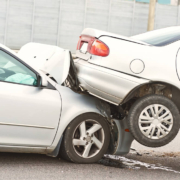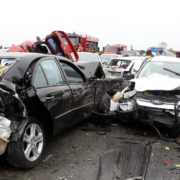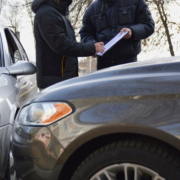Should You Settle or Litigate Your Car Accident Claim?
Car accidents may leave the vehicle occupants grappling with physical injuries, emotional distress, and financial burdens. When pursuing compensation for damages, the decision of whether to settle or litigate becomes critical. A vast majority of car accident lawsuits in the country end in settlements. In fact, only about 4% to 5% of personal injury cases go to trial.
The Basics of Settlement vs. Litigation
Before getting into the decision-making process, you should understand the fundamental differences between settling and litigating a car accident claim.
- Settlement: In a settlement, parties involved in a car accident agree on compensation terms without going to court. This often involves negotiations between the injured party, their attorney, and the at-fault party’s insurance company.
- Litigation: Litigation involves taking the case to court, where a judge and possibly a jury will determine the outcome of the claim. This process can be time-consuming, more adversarial, and may involve a trial.
Factors Influencing the Decision of Settlement vs. Litigation
- Extent of Injuries: If the injuries sustained in the accident are severe and result in substantial medical expenses, ongoing treatment, or long-term disability, litigating the claim may be necessary to ensure adequate compensation.
- Clear Liability: A clear determination of liability can significantly impact the decision. If the fault is undisputed, settling may be a quicker and more straightforward option. In relation to this, if liability is contested, litigation may be necessary to establish fault through legal proceedings.
- Insurance Policy Limits: The at-fault party’s insurance policy limits play a crucial role. If the available insurance coverage is sufficient to cover your damages, settling might be a viable option. Moreover, if the damages exceed policy limits, litigation may be necessary to pursue additional compensation.
- Time Constraints: Settling a claim is generally a quicker process than going through litigation. If you need prompt resolution to cover immediate expenses, settling may be a more suitable option.
- Future Implications: Consider the long-term implications of your decision. Settlements offer certainty and closure, while litigation involves a level of uncertainty and potential emotional stress. Evaluate how each option aligns with your goals and priorities.
Advantages of Settlements in Car Accident Claims
Quicker Resolution
One of the most significant advantages of settlements is the expedited resolution they offer. Trials can be time-consuming, involving complex legal procedures, court schedules, and potential delays. Settlements allow parties to reach a resolution much faster, providing timely compensation for the injured party without protracted legal proceedings.
Cost-Effectiveness
Settlements are generally more cost-effective than going to trial. Litigation involves legal fees, court costs, expert witness fees, and other expenses that can accumulate rapidly. By settling, parties avoid these additional costs, making the resolution more financially efficient for both sides.
Reduced Stress and Emotional Strain
Legal proceedings, especially trials, can be traumatic and emotionally draining for the injured victim and their family. Settlements offer a way to resolve the matter amicably, reducing the stress and emotional strain associated with court appearances, depositions, and the adversarial nature of trials.
Privacy and Confidentiality
Settlements provide a level of privacy and confidentiality that trials do not. Court proceedings are a matter of public record, while settlements can remain confidential. This is advantageous for individuals who may prefer to keep the details of their case out of the public eye.
Control Over Outcome
In a settlement, both parties have more control over the outcome. The negotiation process allows for flexibility in crafting a mutually agreeable resolution. Parties can consider non-monetary terms, such as apologies, changes in policies, or other concessions that may not be available in a courtroom setting.
Predictability Factor
Settlements offer a level of predictability that trials may not. The outcome of a trial is uncertain and rests in the hands of a judge or jury. In contrast, settlements provide a more certain and agreed-upon outcome, allowing parties to know the terms of the resolution in advance.
Preservation of Relationships
In cases where the parties have an ongoing relationship, such as in workplace or community settings, settlements can help preserve these relationships. Litigation can strain relationships and create animosity, while settlements provide an opportunity for parties to find common ground and move forward more amicably.
Adaptability to Unique Circumstances
Every personal injury case is unique, and settlements allow parties to tailor the resolution to their specific circumstances. This adaptability is particularly beneficial when considering non-economic damages, such as pain and suffering, emotional distress, and quality of life, which may not be as effectively addressed in a courtroom setting.
Key Attributes of a Top Car Accident Lawyer to Achieve Successful Settlements
Legal Skills and Experience
The legal skills and experience of a car accident lawyer play a key role in negotiating higher settlements. A lawyer with a deep understanding of personal injury laws, insurance regulations, and negotiation tactics is better equipped to navigate the complexities of a car accident case. Strong legal skills enable the attorney to present a compelling case, analyze the strengths and weaknesses of the opposing party’s arguments, and strategically negotiate for a favorable settlement.
Additionally, experience in handling similar cases enhances the attorney’s ability to assess the value of a claim accurately. A seasoned car accident lawyer can leverage their knowledge to identify key factors that strengthen the case, anticipate the tactics of the opposing party, and negotiate from a position of strength.
Trial Readiness even while Settlement Negotiations are Ongoing
Demonstrating trial readiness, even when settlement negotiations are ongoing, can significantly enhance a lawyer’s negotiating leverage. Insurance companies and defendants are more likely to offer higher settlements when they recognize that the attorney is fully prepared to take the case to trial if a fair settlement cannot be reached.
A car accident lawyer who is trial-ready sends a powerful message to the opposing party. It conveys that the attorney is confident in the strength of their case, willing to pursue litigation if necessary, and capable of presenting a compelling argument in court. This readiness can motivate the opposing party to engage in more serious and favorable negotiations to avoid the uncertainties and potential costs associated with a trial.
A Proven Record of Large Settlements and Verdicts
A car accident lawyer’s track record of achieving substantial settlements and verdicts in similar cases is a potent negotiating tool. A formidable record demonstrates to the opposing party that the attorney has a history of success in securing favorable outcomes for their clients. This reputation can instill confidence in the plaintiff’s case and create an expectation that the attorney is fully capable of achieving a similar result in the current matter.
Insurance companies and defendants often consider an attorney’s track record when assessing the potential risks of going to trial. If a lawyer has a history of securing substantial verdicts, the opposing party may be more inclined to settle for a higher amount rather than face the possibility of a significant judgment against them in court.
Maximize Your Compensation with Our Car Accident Lawyers on Your Side
The decision to settle or litigate your car accident claim should be based on a careful evaluation of various factors. At Garmo & Garmo, LLP, our seasoned personal injury attorneys will deeply investigate the facts and circumstances surrounding your case and build compelling evidence to prove liability. To learn about your legal options, schedule a free case evaluation with us today. Give us a call at 619-897-2144 or fill out this contact form.












